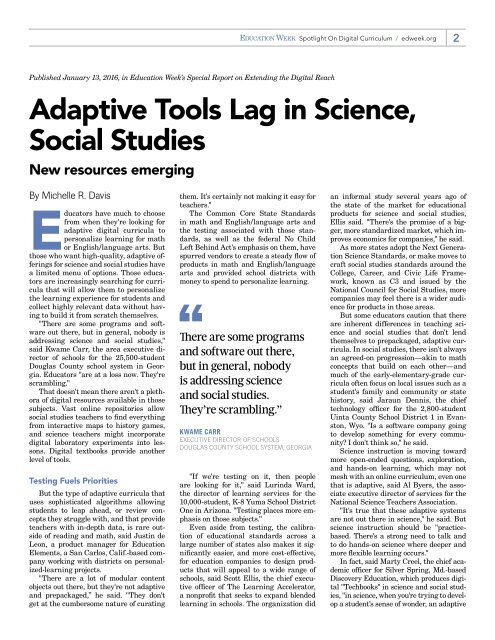Digital Curriculum
Spotlight-Digital_Curriculum-Sponsored
Spotlight-Digital_Curriculum-Sponsored
You also want an ePaper? Increase the reach of your titles
YUMPU automatically turns print PDFs into web optimized ePapers that Google loves.
Spotlight On <strong>Digital</strong> <strong>Curriculum</strong> / edweek.org 2<br />
Published January 13, 2016, in Education Week’s Special Report on Extending the <strong>Digital</strong> Reach<br />
Adaptive Tools Lag in Science,<br />
Social Studies<br />
New resources emerging<br />
By Michelle R. Davis<br />
E<br />
ducators<br />
have much to choose<br />
from when they're looking for<br />
adaptive digital curricula to<br />
personalize learning for math<br />
or English/language arts. But<br />
those who want high-quality, adaptive offerings<br />
for science and social studies have<br />
a limited menu of options. Those educators<br />
are increasingly searching for curricula<br />
that will allow them to personalize<br />
the learning experience for students and<br />
collect highly relevant data without having<br />
to build it from scratch themselves.<br />
"There are some programs and software<br />
out there, but in general, nobody is<br />
addressing science and social studies,"<br />
said Kwame Carr, the area executive director<br />
of schools for the 25,500-student<br />
Douglas County school system in Georgia.<br />
Educators "are at a loss now. They're<br />
scrambling."<br />
That doesn't mean there aren't a plethora<br />
of digital resources available in those<br />
subjects. Vast online repositories allow<br />
social studies teachers to find everything<br />
from interactive maps to history games,<br />
and science teachers might incorporate<br />
digital laboratory experiments into lessons.<br />
<strong>Digital</strong> textbooks provide another<br />
level of tools.<br />
Testing Fuels Priorities<br />
But the type of adaptive curricula that<br />
uses sophisticated algorithms allowing<br />
students to leap ahead, or review concepts<br />
they struggle with, and that provide<br />
teachers with in-depth data, is rare outside<br />
of reading and math, said Justin de<br />
Leon, a product manager for Education<br />
Elements, a San Carlos, Calif.-based company<br />
working with districts on personalized-learning<br />
projects.<br />
"There are a lot of modular content<br />
objects out there, but they're not adaptive<br />
and prepackaged,” he said. "They don't<br />
get at the cumbersome nature of curating<br />
them. It's certainly not making it easy for<br />
teachers."<br />
The Common Core State Standards<br />
in math and English/language arts and<br />
the testing associated with those standards,<br />
as well as the federal No Child<br />
Left Behind Act's emphasis on them, have<br />
spurred vendors to create a steady flow of<br />
products in math and English/language<br />
arts and provided school districts with<br />
money to spend to personalize learning.<br />
There are some programs<br />
and software out there,<br />
but in general, nobody<br />
is addressing science<br />
and social studies.<br />
They’re scrambling.”<br />
Kwame Carr<br />
executive director of schools<br />
Douglas County school system, Georgia<br />
"If we're testing on it, then people<br />
are looking for it," said Lurinda Ward,<br />
the director of learning services for the<br />
10,000-student, K-8 Yuma School District<br />
One in Arizona. "Testing places more emphasis<br />
on those subjects."<br />
Even aside from testing, the calibration<br />
of educational standards across a<br />
large number of states also makes it significantly<br />
easier, and more cost-effective,<br />
for education companies to design products<br />
that will appeal to a wide range of<br />
schools, said Scott Ellis, the chief executive<br />
officer of The Learning Accelerator,<br />
a nonprofit that seeks to expand blended<br />
learning in schools. The organization did<br />
an informal study several years ago of<br />
the state of the market for educational<br />
products for science and social studies,<br />
Ellis said. "There's the promise of a bigger,<br />
more standardized market, which improves<br />
economics for companies," he said.<br />
As more states adopt the Next Generation<br />
Science Standards, or make moves to<br />
craft social studies standards around the<br />
College, Career, and Civic Life Framework,<br />
known as C3 and issued by the<br />
National Council for Social Studies, more<br />
companies may feel there is a wider audience<br />
for products in those areas.<br />
But some educators caution that there<br />
are inherent differences in teaching science<br />
and social studies that don't lend<br />
themselves to prepackaged, adaptive curricula.<br />
In social studies, there isn't always<br />
an agreed-on progression—akin to math<br />
concepts that build on each other—and<br />
much of the early-elementary-grade curricula<br />
often focus on local issues such as a<br />
student's family and community or state<br />
history, said Jaraun Dennis, the chief<br />
technology officer for the 2,800-student<br />
Uinta County School District 1 in Evanston,<br />
Wyo. "Is a software company going<br />
to develop something for every community?<br />
I don't think so," he said.<br />
Science instruction is moving toward<br />
more open-ended questions, exploration,<br />
and hands-on learning, which may not<br />
mesh with an online curriculum, even one<br />
that is adaptive, said Al Byers, the associate<br />
executive director of services for the<br />
National Science Teachers Association.<br />
"It's true that these adaptive systems<br />
are not out there in science," he said. But<br />
science instruction should be "practicebased.<br />
There's a strong need to talk and<br />
to do hands-on science where deeper and<br />
more flexible learning occurs."<br />
In fact, said Marty Creel, the chief academic<br />
officer for Silver Spring, Md.-based<br />
Discovery Education, which produces digital<br />
"Techbooks" in science and social studies,<br />
"in science, when you're trying to develop<br />
a student's sense of wonder, an adaptive


